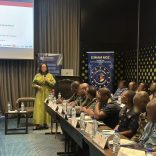Mozambique: Residents of Nametil forced to abandon their homes - AIM | Watch
Mozambique: Chang immunity still impeding extradition – South Africa State Attorney

Gauteng High Court. [File photo: DW]
The lawyer for the South African state [State Attorney] in the extradition case of Manuel Chang, a former Mozambique finance minister, told Lusa on Wednesday that his immunity remains an impediment to his being tried in his country’s ‘hidden debts’ case.
“The issue of immunity still persists in relation to Mr. Chang, and if the minister of justice [of South Africa] had been informed maybe he would have taken a different decision,” Johan van Schalkwyk told Lusa during a break from the day’s hearing at the Gauteng High Court in Johannesburg, to review a decision taken in May in Pretoria to extradite Chang to Mozambique.
“The case should return to the current minister since the former minister of justice did not have all the information at his disposal, and therefore it should be revised so that all the facts are considered, particularly the issue of immunity,” van Schalkwyk stressed.
Chang has been in detention in South Africa since 29 December 2018, at the request of the US, for fraud, corruption and money laundering as part of alleged international fraud of $2.2 billion (€2 billion).
Asked whether the government in Pretoria had received any specific assurances from the authorities in Mozambique that Chang would be prosecuted and tried in that country, if his extradition took effect, Van Schalkwyk said that the response on that issue had been “ambiguous” at best.
“In July this year we received a communication from the government of Mozambique on waiving the immunity [of Chang] but there is still a parliamentary process that must deal formally with that process,” he noted. “It is not enough to say that there is a letter and that we will lift immunity; that process needs to take place [in Mozambique’s parliament] and we consider that he [Chang] should appear personally before parliament in order to address this question and, in order for immunity to be formally lifted, he should make a submission for parliament to decide.
“The final decision is for the minister, but he could be extradited to one of the two countries” – the US of Mozambique, the lawyer added.
The issue of the immunity of the former minister of Mozambique dominated the arguments presented today to the panel of judges in the Gauteng High Court – Colin Lamont, Edwin Molahlehi and Denise Fisher – on the first day of the hearing requested by South Africa’s minister of justice and correctional services, to review the decision to extradite the former minister of Mozambique to his own country.
After his appointment by South Africa’s president, Cyril Ramaphosa, the minister, Ronald Lamola, on 13 July requested a review of the decision to extradite Chang to Mozambique, so going against the decision of his predecessor, Michael Masutha, who on 21 May announced that Change would be sent to the US to face justice there.
Masutha, a member of the governing African National Congress party, announced the decision to extradite Chang to Mozambique on his last day as minister, citing that “it is in the interest of justice to accede to the request of the Republic of Mozambique”.
On 8 April, judge William J.J. Schutte of the magistrates’ court in Kempton Park, near Johannesburg, decided that “there was sufficient evidence” to prosecute Chang in the US for “conspiracy to commit electronic fraud, conspiracy to commit financial fraud and money laundering.”
Since then, Chang has stepped down as a member of Mozambique’s parliament and so lost the immunity that comes with that status, as announced on 24 July by the speaker of the assembly, Verónica Macamo.
However, it is not clear whether parliament and Frelimo, the governing party and that of Chang, had approved the request to waive his immunity.
The arrest and request for extradition of Chang relate to his role in affording state guarantees under the previous government, headed by the then president, Armando Guebuza, for loans of $2.2 billion taken out by the public companies Ematum, Proindicus and MAM, without informing parliament, the country’s Administrative Tribunal, or the country’s creditors.
In New York, where case relating to these ‘hidden debts’ is being handled, three former bankers from Credit Suisse have pleaded guilty of conspiracy to launder money.













Leave a Reply
Be the First to Comment!
You must be logged in to post a comment.
You must be logged in to post a comment.